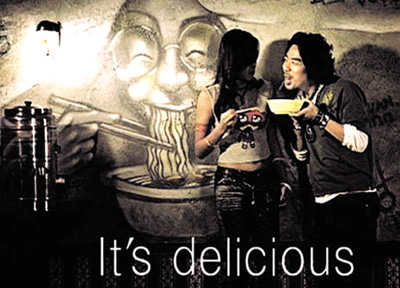
Parody has been applied to every genre of modern day media in Korea. The online comic strip ?ae-Sun-Ja-Gaek bluntly ridicules current political figures and situations, while TV comedy program ?o-brain Survivor simply adds a humorous touch to the original program ?rain Survivor. In the case of commercialism, parody is applied to the latter, a more innocuous form.
Korean commercials have also picked up the idea of applying forms of parody into their commercials. The movie ?he Matrix (1999) contributed greatly in initiating this movement. Kia? Carens commercial had people freeze, while the camera showed the car in slow motion. Samsung Anycall? cell phone showed stars freezing in midair while reaching for the same phone. McDonalds simulation of a certain president? voice to introduce its new burger was also a big hit when it first came out.
The list is endless; however, the biggest turnover in applying parody to commercials was in a commercial depicting the following: a young man nonchalantly dancing into a nightclub with music blurring in the background. Someone then casually hands him a cup noodle. He looks around, and sees his ideal type of girl standing against a wall where he joins her, using the cup of noodles to accost her. Is this scene too familiar? It is the renowned parody commercial of last year? SK Teletech and TBWA Korea? SKY cell phone by Yakult? KING ramen noodles (KING).
This was not the first form of parody applied to commercials in Korea. But there never had been a parody where the whole commercial was taken directly from another. Hardly any changes were made on the contents in the KING commercial except that the cell phone was replaced with a cup of noodles. A little revision in the dialogue, such as the change of SKY? slogan ?t? different to ?t? delicious only added to the humor. The attempt was new, innovative, and used parody in its pure form of mimicry.
SK Teletech officially agreed with Yakult in making this commercial. Since the former commercial was popular, SK Teletech thought the making of a parodied version would continue to publicize viewers of their product. Parody is without doubt being used as a tool of publicity.
According to Yeo Seung-ryul, marketing director at Yakult, the commercial was made in an attempt to reproduce the image of KING from old-fashioned to trendy. ?he commercial was aimed at teens and young adults and we could say that we succeeded in creating that up-to-date image. He also said that the percentage of sales did increase after the commercial was aired, but pointed out that no one could tell if the commercial was the only source for the escalation.
It is certain that parody leaves an instant effect on the crowd. Coca-cola? commercial that featured a close replica of Pepsi man won the hearts of thousands of netizens when it was first uploaded on the comedy site (www.humoruniv.com). Around 2,000 people moved the visual text to other sites on the first day of its release, and 400,000 had viewed the commercial by its sixth day.
With the growing popularity of using parody in commercials, parodies are viewed as consumer-friendly strategies, because it deals with a format already known. Not just that parodies are simply fun to watch. However, whether it really brings about those effects or just a round of laughter is a question to think about.
Jeong Hae-hyun (02, Mass Communications), Account Executive at Korean Advertising (KORAD), says, ?y copying an already existing commercial, the producers are able to reach out to consumers in a way that they are already familiar with. At first the instant reaction will be good and the commercial will be loved, however, if the actual quality of the product doesn? match up to expectations, the commercial will just be forgotten as simply a parody.
tkanie@ewhain.net

